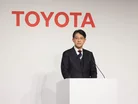How Toyota is driving the course to carbon neutrality

Toyota’s pursuit of carbon neutrality began more than two decades ago with the introduction of the world’s first mass-produced Hybrid Electric Vehicle (HEV).
In the 25 years since, the company has sold more than 20 million EVs, helping to significantly cut CO2 emissions globally by over 160 million tonnes.
But despite being a pioneer and leader in hybrid vehicle technology with its much-admired Prius, the world’s largest carmaker is somewhat lagging globally.
As Japan’s largest company by market value, Toyota refused to join the COP26 agreement to adopt EVs only by 2040 and former CEO Akio Toyoda called EVs “overhyped”.
Toyoda, who stepped down this year, was replaced in April by Koji Sato, who quickly outlined carbon neutrality as one of two key concepts for the way forward, alongside ‘expanding the value of mobility’.
Interestingly, the Japanese giant, rather than going all-in on EVs is taking a diversified approach to sustainability, ensuring solutions are inclusive and cater to all needs.
The bottom line is, depending on where people live and their particular circumstances, mobility needs vary with energy sources, infrastructure readiness and economic conditions all different. It’s a practical, pragmatic approach.
Toyota states that Hybrid Electric Vehicles (HEVs) will continue to be promoted, especially in emerging markets. Plug-in Hybrid Vehicles (PHEVs) will be given improved battery efficiency and increased range beyond 200km.
In addition, Toyota says it will add 10 additional Battery Electric Vehicles (BEVs) by 2026. The company will also develop Hydrogen Combustion Engines, while enhancing the efficiency of internal combustion engine (ICE) vehicles and expanding its carbon neutral fuels initiative.
Toyota is working with various partners on synthetic fuels, bioethanol fuels, and hydrogen based on electricity derived from renewable energy sources.
Just this month, Toyota and oil refiner Idemitsu Kosan announced a tie-up to develop and mass produce all-solid-state batteries. The companies aim to commercialise next-gen batteries in 2027-28, followed by full-scale mass production. Toyota has said it planned to introduce the batteries, which would drastically improve the driving range of EVs, as part of its strategic pivot to EVs announced earlier this year.
Armed with a goal to achieve carbon neutrality by 2050, the Japanese carmaker has put in place a target of 1.5 million EV sales annually by 2026 and 3.5 million BEV sales annually by 2030.
The Toyota Environmental Challenge 2050 aims to achieve carbon neutrality for average GHG emissions from new vehicles by that milestone, but there are earlier targets, too.
By 2035, those GHG emissions are expected to be cut by 50%, and by 33.3% by 2030 – compared to 2019 levels.
The person tasked with ‘Producing Happiness For All’ – Toyota’s stated mission – and is Chief Sustainability Officer Yumi Otsuka.
Otsuka has spent more than 30 years with the company and leads its wider approach to sustainability through stakeholder engagement. She drives shared awareness to guide company decision-making and global impact while increasing partnerships and investments for sustainable innovation, productivity and growth.
She should be enjoying retirement by the time 2050 rolls around, but it will be interesting to see how ‘happy’ the car giant’s shareholders are when we reach that first target in 2030.
Armed with a goal to achieve carbon neutrality by 2050, the Japanese carmaker has put in place a target of 1.5 million EV sales annually by 2026 and 3.5 million BEV sales annually by 2030.
The Toyota Environmental Challenge 2050 aims to achieve carbon neutrality for average GHG emissions from new vehicles by that milestone, but there are earlier targets, too.
By 2035, those GHG emissions are expected to be cut by 50%, and by 33.3% by 2030 – compared to 2019 levels.
The person tasked with ‘Producing Happiness For All’ – Toyota’s stated mission – and is Chief Sustainability Officer Yumi Otsuka.
Otsuka has spent more than 30 years with the company and leads its wider approach to sustainability through stakeholder engagement. She drives shared awareness to guide company decision-making and global impact while increasing partnerships and investments for sustainable innovation, productivity and growth.
She should be enjoying retirement by the time 2050 rolls around, but it will be interesting to see how ‘happy’ the car giant’s shareholders are when we reach that first target in 2030.




